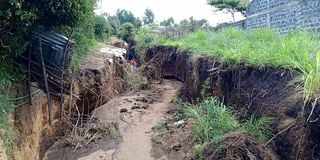Rift in the City: How land cracks threaten multi-million investments in Nakuru

A fissure that formed outside Kai school in Ngata area.
Mr Peter Nasangali, the proprietor of Kai School in Ngata area is a troubled man. Spontaneous land forming processes are threatening to claim his lifetime investment.
The man is staring at a possible collapse of the perimeter fence of his school after a huge gulley formed along the road adjacent to his property.
A surface run off from the heavy downpour in May sipped into a line of weakness before collapsing its walls which widened to a huge gulley, that has eaten up the road and is stretching into his property.
This has forced him to close the main entrance to the school forcing his pupils both in primary and junior high schools to move round the school to access the temporary gate.
Efforts by Mr Nasangali to mobilise residents to fill the gulleys have been futile as the water keeps eroding the walls both horizontally and vertically, thus hampering movement.
“Due to this situation, some parents have decided to transfer their children to other schools after fearing for their safety. Previously we used to fill up the gully with soil but this year’s increased rainfall carted away the bags of soil and collapsed the walls,” says Mr Nasangali.
Apart from the school, the proprietor has also constructed his home on a section of the land where he retires to figure out possible solutions.
But how did he find himself in this situation?

Ladder used by locals to access the school and nagivate the area on June 11,2024.
Mr Nasangali, a teacher by profession and church minister purchased the six-acre parcel of land 16 years ago. He was then a teacher and chaplain at the Nakuru West secondary school.
He decided to set up a school where he would provide education and spiritual nourishment to the young souls while at the same time topping up his income.
By that time, there were few settlements in the area so he was among the few investors around.
“Later on, there were new settlements in the upper lands thus increasing surface runoff which they later directed the water to this direction. And with no proper drainage systems, the waters found their way into a crack along the road which it started eating up,” says Mr Nasangali.
The proprietor, now a retired teacher, regrets pumping close to Sh 50 million life savings in the project which is now at risk of being damaged by the land processes.
“My heart sinks every day when I see the gulley expanding towards my property. I hope the government will move with speed to fill the gulley and construct proper drainage systems.”
His concerns are however similar to those of Benson Mburu, the landlord of a plot in Kaptembwa which was affected by a sinkhole.

The rental houses managed by Isaac Nyambane have since been vacated after a fissure opened up in Kaptembwo.
After a heavy downpour, a sinkhole occurred in the plot and collapsed with some houses on May 10. Fearing for their safety at least 21 tenants decided to move from the plot to safer zones.
Mr Isaac Nyambane, the caretaker who is the only one staying in one of the rooms said the tenants decided to vacate the plot after the incident, noting that some of them left with huge rent areas.

Isaac Nyambane narrates how a fissure that developed adjacent to the rental houses he manages in kaptembwa forced residents out.
“We charged Sh 2,500 for a single room per month which was roughly Sh 500,000 per month but since the incident, no one is ready to risk their lives by renting here,” said Mr Nyambane.
Mr Nyambane said the landlord is still unable to figure out his next move as the government is yet to give proper report on the investigation that can inform his decision.
These geo-hazards in Nakuru county have impacted heavily on the investors who continue to contend with losses occasioned by the occurrence of sinkholes, landslides and fissures.
The said geological activities have affected both the small scale and large-scale investors who are caught off guard by their sudden occurrence.

A crack running across one of the houses managed by Isaac Nyambane that resulted in tenants vacating the premises immediately
Namwel Obure for instance had just leased an acre of land in Kiamunyi before a huge fissure developed on the farm in the wake of a heavy downpour.
The running waters from the higher grounds casted materials on the farm damaging part of his millet.
“I decided to lease this land because it is fertile. However, the new development will affect my output heavily,” says Mr Obure.
In another incident, Caroline Toroitich, the manager at the National Oil in London estate recalls a 2019 incident when they experienced two sinkholes at their business.

Caroline Toroitich, the manager at the National Oil in London estate.
The double sink holes happened within two weeks disrupting normal business.
“We had to temporarily shut the business as we filled the huge hole. it took at least 10 lorries of sand and rocks as well as metal beams to fill the huge hole,” recalls Ms Toroitich.
She indicates that the management was informed that the petrol station sits along the fault line which runs to Nakuru west.
The manager notes that they are always on alert to prevent possible casualties should there be another occurrence.
